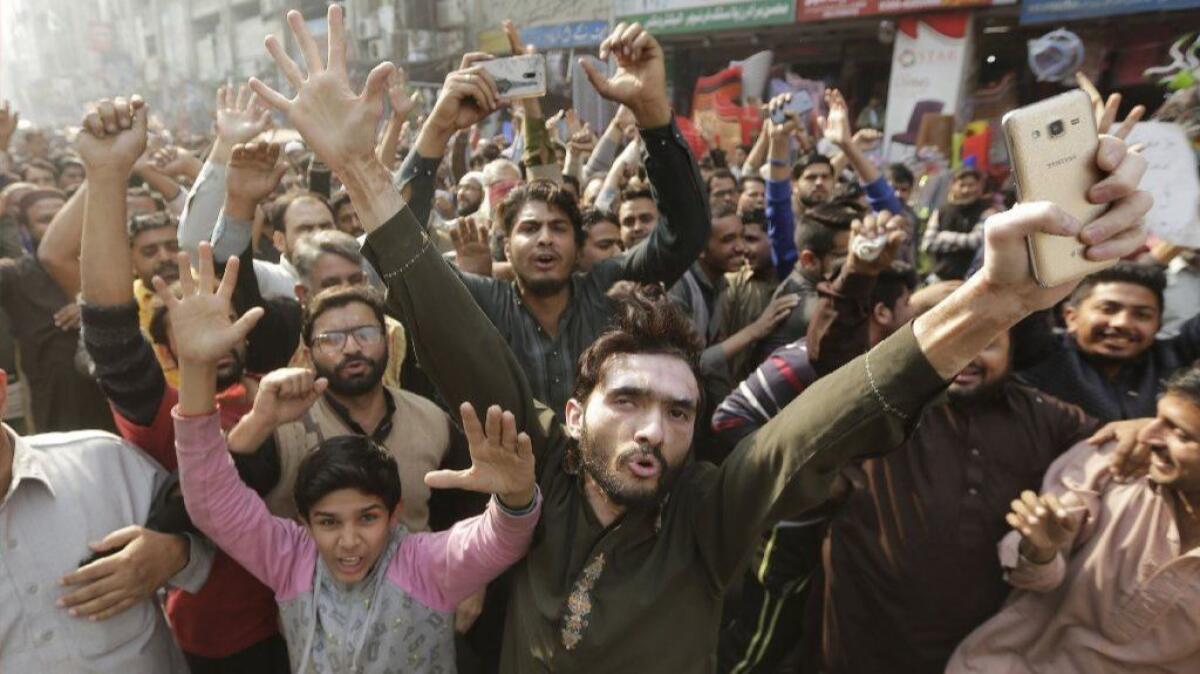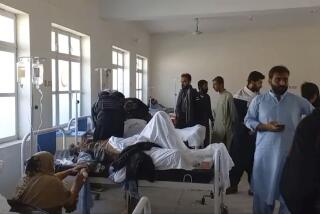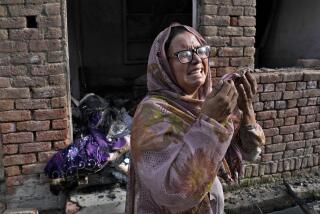Pakistan deploys army in capital after deadly police clash with supporters of radical cleric

Reporting from Islamabad, Pakistan — Pakistani anti-riot police and paramilitary forces fired tear gas and rubber bullets Saturday to disperse thousands of supporters of a radical cleric who had blocked a key road into the capital for two weeks.
Five people were killed and more than 200 injured in the clashes, hospital officials said, while demonstrators responded by burning police and emergency vehicles and attacking houses belonging to governing party officials.
After sunset, with police having suspended the operation due to darkness and thousands more demonstrators streaming toward the Faizabad interchange at the southern edge of Islamabad, the Pakistani Interior Ministry authorized the deployment of army troops into the capital.
The chaotic scenes illustrated the clout of hard-line Islamist leaders in Pakistan and authorities’ inability to maintain security in the face of mob action. Instead the government ordered television stations not to broadcast images of the sit-in, citing the sensitivity of an “ongoing security operation.”
Many private news channels went off the air, and the government directed the telecommunications authority to block access to social media sites such as Facebook and Twitter.
The cleric at the center of the bedlam is Khadim Hussain Rizvi, a relative unknown who rose to prominence in September after his party made a surprisingly strong showing in a by-election in the eastern city of Lahore. Rizvi espouses an ultraconservative strain of Sunni Islamic thought and supports anti-blasphemy laws that allow for draconian penalties for insulting the prophet Muhammad.
The spark for the current crisis came when an amendment to an election law changed the wording of an oath sworn by politicians affirming their belief that Muhammad was the last prophet. The government called the change a clerical error and Parliament reversed it, but Rizvi’s supporters seized on the issue and demanded the resignation of the federal law minister.
Armed with sticks, iron rods, stones and slingshots, approximately 2,000 demonstrators entered Islamabad on Nov. 7 and blocked the main junction between the capital and Rawalpindi, the city that is home to army headquarters.
“Our demand is not a political one but a religious obligation and we are not going to leave Islamabad till our demands are met,” Muhammad Irfan, a 27-year-old demonstrator from Lahore brandishing a stick, said before the clearance operation began. “We are ready to sacrifice our lives for the cause.”
The sit-in left main arteries in both cities horribly jammed, stranding commuters on the roads for hours. Prices of fruits and vegetables have jumped due to transport delays and higher transportation costs.
“It takes me three hours to reach the office daily since the sit-in started. Earlier it used to take half an hour maximum,” said Awais Kiyani, 35, who commutes to central Islamabad from the city’s outskirts.
The government came under severe criticism for its inability to calm a situation that left capital residents at the mercy of a mob that set up its own security checkpoints and effectively eliminated state control for more than a mile surrounding the protest site. Several government deadlines to end the sit-in were ignored, and efforts to open negotiations with the protesters failed.
The interchange took on the feel of a tent city, littered with plastic bags, glasses, cups and food. The protesters spent nights listening to recorded sermons and lyrics in praise of the prophet, sleeping only after morning prayers. The smell of urine permeated the air.
The day before the crackdown, Interior Minister Ahsan Iqbal told reporters that a security operation could “clear the space in a matter of three hours” but police were trying to avoid a repeat of the bloody 2007 confrontation with militants at Islamabad’s Red Mosque, which left more than 150 people dead and sparked a surge in militant attacks nationwide.
Analysts said the government was also in a difficult position because most of Rizvi’s supporters hail from the state of Punjab, the stronghold of Prime Minister Shahid Khaqan Abbasi’s party.
“When elections are scheduled to be held by the middle of next year, the government can’t afford to use violence against the demonstrators,” said Tariq Chaudhry, a senior political analyst in Islamabad.
There were reports of violence late Saturday in other cities. Protesters attacked the house of the federal law minister in a village in the district of Sialkot, east of Islamabad, damaging the main gate and windows. The minister was not home at time, officials said. Rizvi’s supporters blocked major roads in other cities of Punjab as well.
Rizvi’s rise comes amid growing concern over impunity for extremism in Pakistan. Last week, Hafiz Saeed, the Lashkar-e-Taiba militant leader blamed for the 2008 terrorist attacks in Mumbai, India, was released by a court from house arrest. The U.S. State Department, which has issued a $10-million reward for information that brings Saeed to justice, issued a statement saying it was “deeply concerned” by the decision.
Sahi is a special correspondent.
More to Read
Sign up for Essential California
The most important California stories and recommendations in your inbox every morning.
You may occasionally receive promotional content from the Los Angeles Times.










